By Natasha Crain
I’ve recently had a lot of people asking for recommendations for Christmas gift ideas, for both kids and adults, so I’ve put together this detailed list of my top picks! They are almost all books, but there are a few other ideas as well. Gift ideas for kids come first (mostly for the under 12 crowd, since that’s where my own kids are), followed by gift ideas for adults. Enjoy!
30 Christmas Gift Ideas for Christian Kids
Children’s Bibles and Bible Reading Tools
For kids not ready to read a complete Bible, children’s Bibles are a great starting point. They feature selected Bible accounts, a simplified narrative, and engaging pictures. The problem with many children’s Bibles, however, is that they include too little of the Bible (you’ll always get Noah’s Ark, but how about Nehemiah or Job?) and have overly simplified narratives that leave out important points. I’ve looked at lots, and lots of Bibles in this category and the following is my favorite by far:
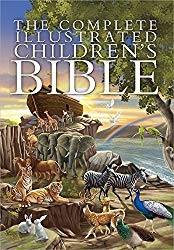 The Complete Illustrated Children’s Bible includes a much greater breadth of biblical accounts than most other children’s Bibles. I love that. The narratives themselves are simple and direct, so they are very accessible. At the same time, you won’t find them watered down in kiddie language as in many books. The illustrations are beautiful. This is almost 300 pages, and there’s nothing I’ve seen that even comes close to the quality here for younger kids. The website says this is targeted at 5- to 8-year-olds. (If you have a child 9+, don’t get a children’s Bible. It’s time to move up to learning to read a full Bible!)
The Complete Illustrated Children’s Bible includes a much greater breadth of biblical accounts than most other children’s Bibles. I love that. The narratives themselves are simple and direct, so they are very accessible. At the same time, you won’t find them watered down in kiddie language as in many books. The illustrations are beautiful. This is almost 300 pages, and there’s nothing I’ve seen that even comes close to the quality here for younger kids. The website says this is targeted at 5- to 8-year-olds. (If you have a child 9+, don’t get a children’s Bible. It’s time to move up to learning to read a full Bible!)
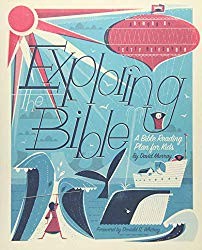 Exploring the Bible: A Bible Reading Plan for Kids isn’t a children’s Bible, but rather a Bible reading plan. Kids won’t read every word of the Bible using this, but it’s a solid selection that takes you beginning to end. Each day there are verses to read with a small box for them to answer a basic question about the reading. For kids who enjoy writing, this makes it more engaging than simply a list of passages to read. I’ll be honest and say I got this for my 9-year-old twins last Christmas and they didn’t get too far with it despite liking the concept and presentation. But I am recommending it because it’s a unique book that would work really well if the parent is committed to focusing on using it as the primary Bible reading tool for the year.
Exploring the Bible: A Bible Reading Plan for Kids isn’t a children’s Bible, but rather a Bible reading plan. Kids won’t read every word of the Bible using this, but it’s a solid selection that takes you beginning to end. Each day there are verses to read with a small box for them to answer a basic question about the reading. For kids who enjoy writing, this makes it more engaging than simply a list of passages to read. I’ll be honest and say I got this for my 9-year-old twins last Christmas and they didn’t get too far with it despite liking the concept and presentation. But I am recommending it because it’s a unique book that would work really well if the parent is committed to focusing on using it as the primary Bible reading tool for the year.
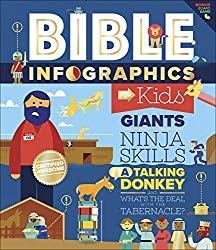 Bible Infographics for Kids is a 50-page book with beautifully designed spreads that present the Bible in infographic form! My 10-year-old son read through this in a day and loved it. Periodically he comes up with some kind of Bible fact that he learned from reading this, so it really stuck with him. It’s an engaging presentation for any kid, but I especially want to highlight this for parents who may have a child who really resists Bible reading. You certainly aren’t reading the actual Bible with this book, but it can be a stepping stone with it’s appealing visual design to get your less-than-focused elementary age boy to sit down and look at the biblical story through different eyes. I think this book is seriously undermarketed, as I have never heard anyone talk about it. I would never have heard of it myself had the publisher not sent me a copy. It would make an excellent gift and is very unique!
Bible Infographics for Kids is a 50-page book with beautifully designed spreads that present the Bible in infographic form! My 10-year-old son read through this in a day and loved it. Periodically he comes up with some kind of Bible fact that he learned from reading this, so it really stuck with him. It’s an engaging presentation for any kid, but I especially want to highlight this for parents who may have a child who really resists Bible reading. You certainly aren’t reading the actual Bible with this book, but it can be a stepping stone with it’s appealing visual design to get your less-than-focused elementary age boy to sit down and look at the biblical story through different eyes. I think this book is seriously undermarketed, as I have never heard anyone talk about it. I would never have heard of it myself had the publisher not sent me a copy. It would make an excellent gift and is very unique!
Children’s Devotionals (12 & Under)
I am extremely picky about devotionals. I can spend the whole afternoon at a Christian bookstore taking them off the shelf, reading a few selections, and deciding to put them back because 1) they are too simple/watered down, 2) they are theologically not even quite right, or 3) they are focused on character development (“here’s how to be a good person!”) far more than Jesus himself. I also want to be clear that I would never recommend devotionals as a substitute for reading the Bible with your kids. But, as a supplement that kids can read on their own or with you, they can be helpful…if they aren’t bad. With that in mind, here are a select few I have chosen and appreciated (note my kids are all 10 and under, so I, unfortunately, do not have recommendations yet for the teen crowd). I’m listing them in order from youngest to oldest audience.
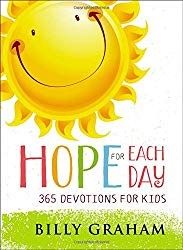 Hope for Each Day: 365 Devotions for Kids is listed as a devotional for 6- to 10-year-olds, but I would say it’s more for 4- to 8-year-olds (older kids need more meat than this provides). For the younger crowd, these are solid, theologically accurate devotions that get beyond the surface and are great discussion starters (not that that’s what you want before bed!).
Hope for Each Day: 365 Devotions for Kids is listed as a devotional for 6- to 10-year-olds, but I would say it’s more for 4- to 8-year-olds (older kids need more meat than this provides). For the younger crowd, these are solid, theologically accurate devotions that get beyond the surface and are great discussion starters (not that that’s what you want before bed!).
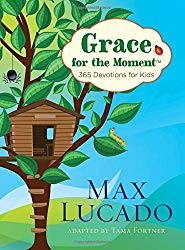 Grace for the Moment: 365 Devotions for Kids is another solid choice for younger kids. This one, too, is listed for 6- to 10-year-olds, but I would say it should skew a little younger (more like 5 to 8 or 9). These are short devotions that end with some questions for self-reflection. I liked that the book (in both design and content) is appropriate for boys or girls so you can use them for family time with multiple kids.
Grace for the Moment: 365 Devotions for Kids is another solid choice for younger kids. This one, too, is listed for 6- to 10-year-olds, but I would say it should skew a little younger (more like 5 to 8 or 9). These are short devotions that end with some questions for self-reflection. I liked that the book (in both design and content) is appropriate for boys or girls so you can use them for family time with multiple kids.
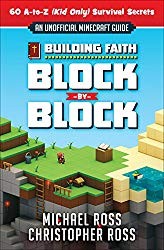 Building Faith Block by Block [An Unofficial Minecraft Guide] is a devotional for boys who are Minecraft lovers. Each devotional features a Minecraft story and then applies it briefly to a Bible passage with some questions for reflection. Unlike the other devotionals, I did not evaluate this in depth before getting it. My son loves Minecraft, and I trust his judgment, so I decided to let him read and tell me what he thought of it. He really liked it but concluded it was heavy on the Minecraft and light on the biblical learning. Still, I wanted to include it here because if you have a boy who isn’t inclined toward devotionals but likes Minecraft (I bet there are many!), this could be a great way to begin getting them to engage more with the Bible. I’m shocked the website says it’s for kids 12 to 18. I would say 8 to 12.
Building Faith Block by Block [An Unofficial Minecraft Guide] is a devotional for boys who are Minecraft lovers. Each devotional features a Minecraft story and then applies it briefly to a Bible passage with some questions for reflection. Unlike the other devotionals, I did not evaluate this in depth before getting it. My son loves Minecraft, and I trust his judgment, so I decided to let him read and tell me what he thought of it. He really liked it but concluded it was heavy on the Minecraft and light on the biblical learning. Still, I wanted to include it here because if you have a boy who isn’t inclined toward devotionals but likes Minecraft (I bet there are many!), this could be a great way to begin getting them to engage more with the Bible. I’m shocked the website says it’s for kids 12 to 18. I would say 8 to 12.
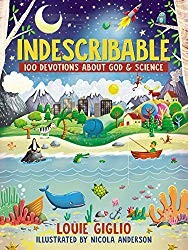 Indescribable: 100 Devotions about God & Science has 100 devotions for science-loving kids (boys or girls). They focus on amazing facts about God’s creation, and there’s some really interesting stuff in here! The whole idea is to help kids realize how powerful, intelligent, personal, and purposeful our Creator is. It’s also an attractive book, with cute illustrations throughout. As I’m sure some will be wondering, this book is mostly appropriate regardless of your view on the age of the Earth. However, there are a few devotionals that are specific to a young Earth view (e.g., a chapter on “Shooting down the Big Bang”).
Indescribable: 100 Devotions about God & Science has 100 devotions for science-loving kids (boys or girls). They focus on amazing facts about God’s creation, and there’s some really interesting stuff in here! The whole idea is to help kids realize how powerful, intelligent, personal, and purposeful our Creator is. It’s also an attractive book, with cute illustrations throughout. As I’m sure some will be wondering, this book is mostly appropriate regardless of your view on the age of the Earth. However, there are a few devotionals that are specific to a young Earth view (e.g., a chapter on “Shooting down the Big Bang”).
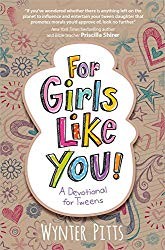 For Girls Like You: A Devotional for Tweens is a good choice for tween girls who are drawn more to girl-specific examples and a relational approach. While it’s not in depth, it’s theologically solid. My 10-year-old daughter, who sometimes has trouble holding interest to finish whole books, finished this one on her own with no prompting from me. If your daughter likes this one, Wynter Pitts has a second book which I would equally recommend, called You’re God’s Girl. There’s also a matching coloring book which would make a nice complementary gift!
For Girls Like You: A Devotional for Tweens is a good choice for tween girls who are drawn more to girl-specific examples and a relational approach. While it’s not in depth, it’s theologically solid. My 10-year-old daughter, who sometimes has trouble holding interest to finish whole books, finished this one on her own with no prompting from me. If your daughter likes this one, Wynter Pitts has a second book which I would equally recommend, called You’re God’s Girl. There’s also a matching coloring book which would make a nice complementary gift!
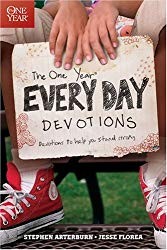 The One Year Everyday Devotions: Devotions to help you stand strong is a good choice for both boys and girls in the 9 to 12 age range. The readings are quite short, but they make some deep points and apply to everyday situations. If you have a girl who isn’t super “girly”, this is a perfect choice (no pink princesses here!).
The One Year Everyday Devotions: Devotions to help you stand strong is a good choice for both boys and girls in the 9 to 12 age range. The readings are quite short, but they make some deep points and apply to everyday situations. If you have a girl who isn’t super “girly”, this is a perfect choice (no pink princesses here!).
Apologetics Books
Apologetics is the study of how we know Christianity is true. If you want to raise faithful kids in a challenging secular world, teaching apologetics is crucial. Raising your kids with this understanding ultimately must start with you (so see my book recommendations under the parents’ section below), but there are a few excellent apologetics books for kids under 12 as well. These should go hand in hand with all else you’re doing!
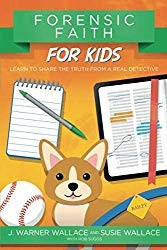
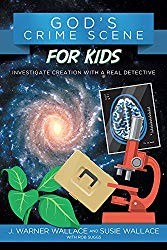
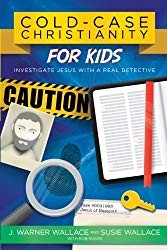
The most comprehensive set of books in this category is the trilogy by J. Warner Wallace. Wallace is a cold-case homicide detective and former atheist who became a Christian after applying detective methodologies to the investigation of biblical reliability. He has three adult books that investigate the truth of Christianity from a similar detective’s perspective: God’s Crime Scene (evidence for God’s existence), Cold-Case Christianity(evidence for Christianity specifically), and Forensic Faith (the necessity of having a faith based on good evidence). I recommend these all the time, and now he has excellent kids’ versions of the same books: Forensic Faith for Kids, God’s Crime Scene for Kids and Cold-Case Christianity for Kids. They are written for 8- to 12-year-olds and correspond to the chapter sequence of the adult versions so you can study together. Because they are written in a detective style, they are really engaging. These books are easy reads that are packed with value for 8- to 12-year-olds. There’s even a free website with corresponding videos and worksheets. I’d recommend getting all three, but if you start with just one, I’d go with Forensic Faith for Kids because it establishes the importance of apologetics before they dig deeper.
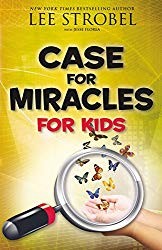 You’re probably familiar with Lee Strobel’s best-selling book, Case for Christ. You may or may not know he has a whole series of similar books that make a case for the truth of Christianity from a journalist’s perspective, and great kids’ versions to go with them. Check out the following titles and see which might be of greatest interest to your 9- to 12-year olds: Case for Miracles for Kids, Case for a Creator for Kids, Case for Christ for Kids, Case for Faith for Kids, and Case for Grace for Kids.
You’re probably familiar with Lee Strobel’s best-selling book, Case for Christ. You may or may not know he has a whole series of similar books that make a case for the truth of Christianity from a journalist’s perspective, and great kids’ versions to go with them. Check out the following titles and see which might be of greatest interest to your 9- to 12-year olds: Case for Miracles for Kids, Case for a Creator for Kids, Case for Christ for Kids, Case for Faith for Kids, and Case for Grace for Kids.
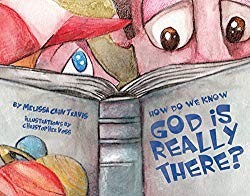
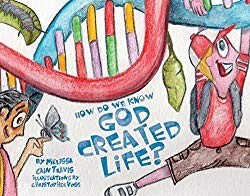
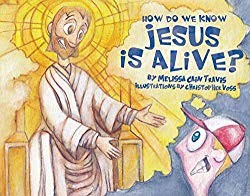
Melissa Cain Travis has written a trilogy of illustrated storybooks that explain key apologetics concepts through an engaging tale (to be read in a single setting). These are very cool because most books for 9- to 12-year-olds aren’t designed to be read in a single session. These are great for the family to read together and then discuss. Kids can then go back and read them on their own. The three books are: How Do We Know God is Really There?, How Do We Know God Created Life?, and How Do We Know Jesus is Alive?
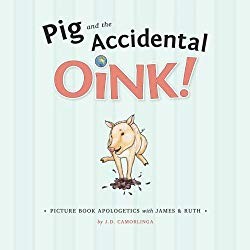
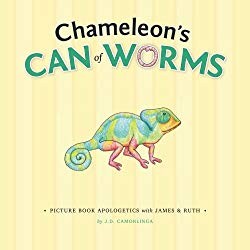
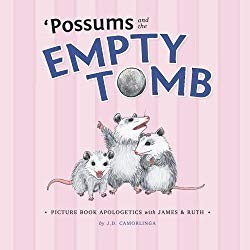
If you have kids in the 5-8 age range, who aren’t ready for the books I just talked about, start here! The Picture Book Apologetics series talks about apologetics concepts at the most basic level, and have sweet, simple pictures to capture a young child’s imagination. Pig and the Accidental Oink! (Volume 1) introduces the cosmological argument (that the universe had to have a creator), Chameleon’s Can of Worms (Volume 2) introduces the problem with moral relativism (some things are not a matter of opinion!), Possums and the Empty Tomb (Volume 3) introduces evidence for the resurrection, Fox and the Hard Day helps kids understand the problem of evil, and Pooch and the Pearly Gates teaches kids about heaven and the new Earth. In addition to these story books, the authors have a kid’s book on logical fallacies (i.e., errors people make in reasoning, and how to think more critically). The content of this one would be more appropriate for kids 8+: Pitfalls: A Quick Guide to Identifying Logical Fallacies for Families.
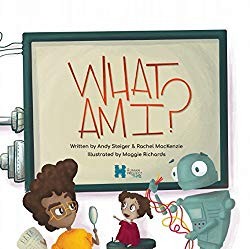
What Am I? is the story of a boy named Amare, his robot Bobo, and his little sister Nya. Amare makes a variety of things, like a tower and a cage, and asks his robot what he thinks. The robot always replies with a description of what those things are made of–“Excellent collection of colourful plastic parts.” Amare explains that they are made of the same parts, but they are made FOR very different things. He then explains all his inventions and what they are made FOR even though Bobo, as a robot, can only detect what they are made OF. Eventually, Amare goes to his mom to ask what HE is made for and learns that if you want to find out what you were made for, you need to ask the one who made YOU. Amare and Nya go on to learn what God told us he made humans for. I LOVE that this book tackles the naturalistic worldview (that we’re nothing more than our physical parts) head-on at a level perfect for elementary age kids to understand. It’s a 30-page picture book and easy to read, yet will facilitate deep conversations.
Non-Book Gifts
While this post is focused on book gifts, there are a couple of awesome non-book gifts I would highly recommend.
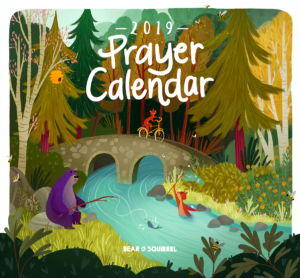 Bear & Squirrel is a company that puts out a yearly prayer calendar. The images are amazingly adorable each month and every day tells you what to pray for! It’s such a great way to give kids ideas of how to pray in more diverse ways than “thank you for today.” We bought one for 2018 for all of our kids, and they loved them.
Bear & Squirrel is a company that puts out a yearly prayer calendar. The images are amazingly adorable each month and every day tells you what to pray for! It’s such a great way to give kids ideas of how to pray in more diverse ways than “thank you for today.” We bought one for 2018 for all of our kids, and they loved them.
 I am constantly inspired by the amazing work that author Kristen Welch from We Are That Family does around the world to create jobs. Earlier this year I subscribed to her fair trade bracelet of the month club. For $15 each month you receive a beautiful handmade bracelet that empowers women in difficult economic (and other) circumstances. I have two daughters, so they take turns getting to have the bracelets that come. They look forward to receiving them every month and learning about the women who crafted them. This is an extremely meaningful gift that your daughter can receive throughout the year.
I am constantly inspired by the amazing work that author Kristen Welch from We Are That Family does around the world to create jobs. Earlier this year I subscribed to her fair trade bracelet of the month club. For $15 each month you receive a beautiful handmade bracelet that empowers women in difficult economic (and other) circumstances. I have two daughters, so they take turns getting to have the bracelets that come. They look forward to receiving them every month and learning about the women who crafted them. This is an extremely meaningful gift that your daughter can receive throughout the year.
 We don’t watch a lot of videos, so this list is conspicuously missing recommendations in this area. However, I am absolutely crazy about Owlegories. There are six DVDs with a total of 18 episodes so far. Each episode is short, adorable, and actually quite funny (as in, makes an adult laugh with its clever humor). They teach great lessons about the Bible that get away from cliches and feature special messages at the end of each by a well-known Christian teacher such as Matt Chandler. My son AND daughters like these. They would make a wonderful stocking stuffer!
We don’t watch a lot of videos, so this list is conspicuously missing recommendations in this area. However, I am absolutely crazy about Owlegories. There are six DVDs with a total of 18 episodes so far. Each episode is short, adorable, and actually quite funny (as in, makes an adult laugh with its clever humor). They teach great lessons about the Bible that get away from cliches and feature special messages at the end of each by a well-known Christian teacher such as Matt Chandler. My son AND daughters like these. They would make a wonderful stocking stuffer!
30 Christmas Gift Ideas for Christian Adults
Since almost all of my reading is on apologetics and theology, I’m going to focus these gift ideas on books in these areas. There are so many great books that can be recommended, but my goal here is to give one great idea for each type of gift recipient I list. Since this is recipient-based rather that category-based, I won’t include detailed descriptions as I did above. If you are looking for a gift for someone matching the description, just click over to Amazon to read more. In no particular order…
For both prayer warriors and those who struggle to pray:
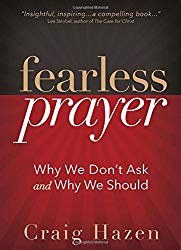
For those going through a difficult time caring for others:
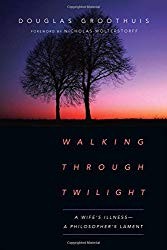
For those who want (or need!) to begin learning about the reliability of the Bible (this is a FABULOUS new, short, and accessible book):
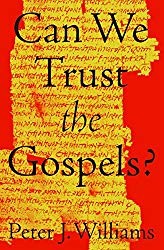
For newer Christians, or Christians who want to have a better understanding of how the whole biblical narrative fits together:
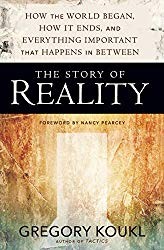
For Christians who want to better understand the evidence for the deity of Christ:
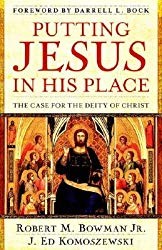
For Christians struggling with doubt in their faith:
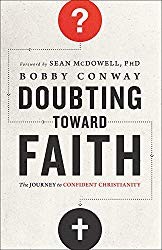
For Christians interested in a theological and scientific critique of theistic evolution (the idea that God created everything through evolutionary processes):
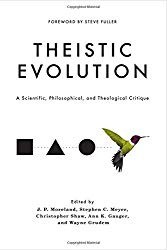
For Christians who want (or need) to begin learning about the importance of apologetics for their faith:
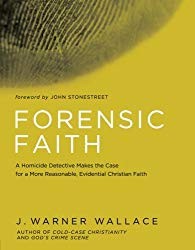
For Christians who are interested in the intersection of culture and faith on topics of sexuality:
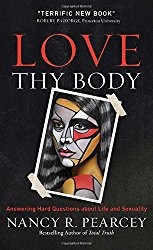
For Christians who are interested in a critique of the atheistic worldview and better understanding its logical implications:
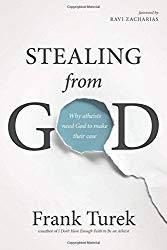
For Christian parents who want to start learning apologetics so they can be better prepared to have deep conversations about faith with their kids of any age (yes–this is my own book!):
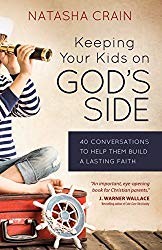
For Christian parents who want to start having conversations with their kids about the evidence for God’s existence, the relationship between God and science, the nature of God, and the logical implications of a Christian vs. atheistic worldview (my second book!):
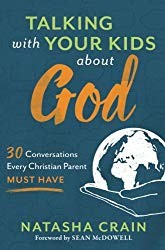
For Christians who are struggling with or want to better understand the existence of evil and suffering:
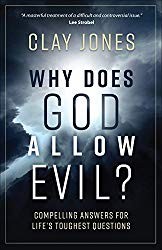
For Christians who want to study the book of Psalms in a creative way (e.g., coloring and journaling):
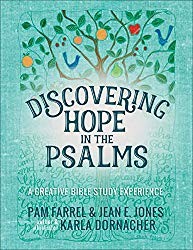
For Christians who want a primer on basic theology:
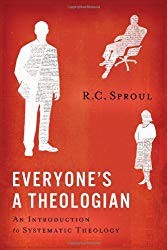
For Christians who are passionate about apologetics and love meaty reference books (this is the recent complete update to the classic–it’s incredible!):
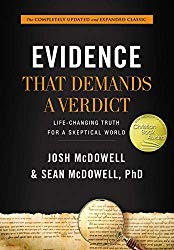
For Christians who have read everything you’ve heard of on apologetics and you want to find something probably off their radar (I randomly discovered this book a couple of months ago, and it was so enlightening, yet I’ve never seen anyone talking about it!):
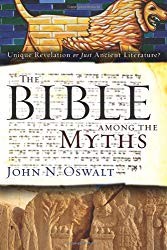
For Christians interested in the topic of free will vs. God’s sovereignty from a non-Calvinistic view:
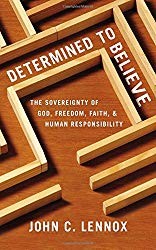
For Christians interested in Old Testament issues of violence, slavery, morality, etc.:
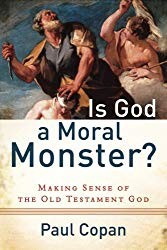
For Christians interested in understanding Islam:
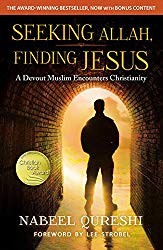
For Christians who want to better understand the attributes of God:
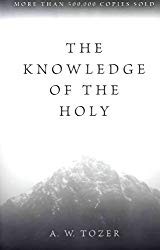
For Christians who are interested in the intersection of faith and science (and how science supports faith):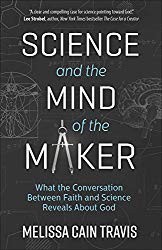
For Christians interested in the evidence for God’s supernatural involvement in the world: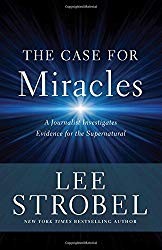
For Christians who enjoy a clever, edgy sense of humor and critiques of atheism: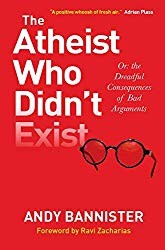
For Christians interested in early Christian distinctiveness in the Roman world:
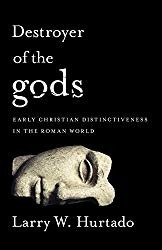
For Christians who aren’t necessarily into apologetics but would enjoy reading answers to common tough questions asked by skeptics: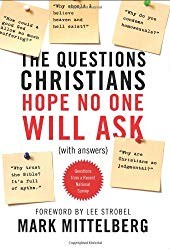
For Christians interested in how modern scholars distort the Gospels:
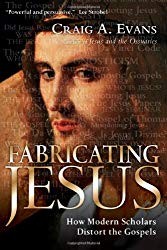
For Christians going on or returning from short-term mission trips:

For Christians who have read basic books on the reliability of the Gospels and want to dig deeper:
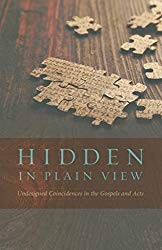
For Christian women who struggle with perfectionism:

If you found this post helpful, please share with others!
Natasha Crain is a blogger, author, and national speaker who is passionate about equipping Christian parents to raise their kids with an understanding of how to make a case for and defend their faith in an increasingly secular world. She is the author of two apologetics books for parents: Talking with Your Kids about God (2017) and Keeping Your Kids on God’s Side (2016). Natasha has an MBA in marketing and statistics from UCLA and a certificate in Christian apologetics from Biola University. A former marketing executive and adjunct professor, she lives in Southern California with her husband and three children.
Original Blog Source: http://bit.ly/2A0V0E4
True for you but not for me? Plus More Q&A!
PodcastPodcast: Play in new window
Subscribe: Apple Podcasts | Spotify | Amazon Music | Android | iHeartRadio | Blubrry | Email | TuneIn | RSS
Frank continues to answer questions from you, our amazing audience! He got the following question via email “Yesterday, I had a discussion with a friend who is a postmodernist. He believes in the statement, “it’s true for you, but not for me.” I pulled up the CrossExamined app and showed him the example of the customer and the bank teller. My friend’s response to that example was, “the customer and the bank teller are both absolute in their truth.” How do you answer that? Listen to this podcast to find out as Frank answer that questions and many more during this episode of the CrossExamined Podcast!
Happy New Year to all of our listeners and don’t forget to gift us a 5-star rating and a positive review on iTunes!
You can also help us by donating here: https://crossexamined.org/donate/ we have a $20,000 matching grant until the end of 2018!
Keep Frank busy by sending your questions to Hello@CrossExamined.org and don’t miss this episode!
Subscribe on iTunes: apple.co/CrossExamined_Podcast rate and review! Thanks!!!
Subscribe on Spotify: http://bit.ly/CrossExaminedOfficial_Podcast
Subscribe on Stitcher: http://bit.ly/CE_Podcast_Stitcher
Why You, Yes You, Need to Defend What Is True
Theology and Christian ApologeticsBy Michael Sherrard
What is going on? Can you imagine if you fell into a coma and woke up in 2015? Or if you had a Delorean and traveled from 1985 to 2015? So there’s no hoverboards, but there are computers that fit in your pocket and boys that think they are girls and are allowed to shower in the girl’s locker room. And they win awards for their bravery.
Anybody angry? Anybody feel overwhelmed? Anybody want to run and start a commune? Anyone ready to fight? Anybody just feels broken over the lostness? Hearing these stories causes a lot of different emotions, doesn’t it? It’s a troubling time for many? And it has brought much confusion.
What are we to do in the midst of all that is going on?
First, Christians we do not lose heart. And we certainly aren’t going to fear what is going on.
We trust in a mighty God and our hope will not be disappointed. We are to be strong and courageous. We are to act. Jesus did not redeem us for irrelevance. So what are we to do?
The way forward must involve these three things if we wish to see our culture flourish once again. We, the true followers of Jesus Christ, need to clean up our house, learn how to defend our beliefs, and expose sin for what it is.
This excerpt from “Where Do We Go From Here” highlights the need for all believers to be able to defend Christianity, show images like aborted children, and tell our redemptive stories.
Hear:
Michael C. Sherrard is a pastor, the director of Ratio Christi College Prep, and the author of Relational Apologetics. Booking info and such can be found at michaelcsherrard.com.
Original Blog Source: http://bit.ly/2LidfJE
Is Isaiah 7:14 a Messianic Prophecy?
Jesus Christ, Theology and Christian ApologeticsBy Brian Chilton
More and more scholars are becoming skeptical of Messianic prophecy in the Hebrew Bible—that is, the Old Testament. Michael Rydelniknotes that “Although evangelical scholarship still recognizes that there is something messianic about the Hebrew Bible, for the most part, it sees it as a story that finds its climax in Jesus, not as predictions that Jesus of Nazareth fulfilled” (Rydelnik, The Messianic Hope,3-4). Yet, such skepticism is not justified. Sure, some passages in the Hebrew Bible have been stretched beyond its scope, something that can become a dangerous trend. Nevertheless, certain passages in the Hebrew Bible enjoy a status of being both Messianic in context and in its history.
One such Messianic prophecy is found in Isaiah 7:14. Four schools of thought have developed on how one should interpret Isaiah 7:14. Some hold to direct fulfillment indicating that the text only speaks to the fulfillment found in Messiah. Others hold to a historical fulfillment which claims that the text only addresses the birth of a child in Isaiah’s day. A third view holds to a double fulfillment in that the prophecy was fulfilled to a degree in Isaiah’s day and later in the Messiah. A fourth view is espoused by Arnold Fruchtenbaum. He calls it a double reference (Fruchtenbaum, Yeshua, 364). A double reference “states that one piece of Scripture actually contains two prophecies, each having its own fulfillment” (Fruchtenbaum, Yeshua,364). After researching the passage, I must agree that in Isaiah 7:14 one finds a double reference. Although Isaiah 7:14 is among the most controversial of Messianic prophecies (Rydelnik, The Messianic Hope, 147), several good reasons exist to accept the prophecy as Messianic in scope.
Isaiah 7:14 is a glorious passage that prophesies the birth of a royal, divine king that was to be born in the most miraculous of fashions. In our attempt to properly interpret the Bible, let us not be drawn to a hyper-skepticism that very well could combat the very thinking of the writers of the New Testament. They held the text to be Messianic not because they made it that way, but because that was the prophetic intention of the text.
Sources
Fruchtenbaum, Arnold G. Yeshua: The Life of Messiah from a Messianic Jewish Perspective. Volume One. San Antonio, TX: Ariel, 2017.
Rydelnik, Michael. The Messianic Hope: Is the Hebrew Bible Really Messianic? NAC Studies in Bible & Theology. Edited by E. Ray Clendenen. Nashville: B&H Academic, 2010.
Brian G. Chilton is the founder of BellatorChristi.com and is the host of The Bellator Christi Podcast. He received his Master of Divinity in Theology from Liberty University (with high distinction); his Bachelor of Science in Religious Studies and Philosophy from Gardner-Webb University (with honors); and received certification in Christian Apologetics from Biola University. Brian is currently enrolled in the Ph.D. program in Theology and Apologetics at LibertyUniversity and is a member of the Evangelical Theological Society and the Evangelical Philosophical Society. Brian has been in the ministry for over 15 years and serves as the Senior Pastor of Westfield Baptist Church in northwestern North Carolina.
Original Blog Source: http://bit.ly/2zWk139
Were Jesus’ Temptations Real If He Couldn’t Sin?
Jesus Christ, Theology and Christian ApologeticsBy Ryan Leasure
Historic Christianity affirms that Jesus Christ, though fully human, is also fully divine. He is the Alpha and Omega, the beginning and the end (Rev. 22:13) — the eternal creator of all things (Jn. 1:3). The Nicene Creed (AD 325) declares of Jesus that he is:
God from God, Light from Light, true God from true God, begotten, not made; of the same essence as the Father. Through him, all things were made.1
With Jesus’ deity established, can we honestly say Jesus could experience genuine temptations? After all, James 1:13 declares that “God cannot be tempted by evil.” Doesn’t this present a bit of a dilemma for the biblical Christian? If Jesus was impeccable, that is, he was unable to sin, to what extent can we say that his temptations really affected him?
On the surface, it seems that Christians can’t take much comfort from Hebrews 4:15 which reads, “For we do not have a high priest who is unable to empathize with our weaknesses, but we have one who has been tempted in every way, just as we are — yet he did not sin.”
Can we really say he was tempted in every way as we are? I experience temptation all the time and give in to those temptations more than I’d like to admit. That wasn’t a problem for Jesus, though. He couldn’t give in to his temptations. Doesn’t this seem like apples and oranges to you?
While I affirm that Jesus was unable to sin due to being fully divine, in the remaining space, I want to demonstrate that he experienced genuine temptations as a human. And I want to show that we can believe both truths simultaneously.
A SPIRIT-FILLED HUMAN
I contend that the reason Jesus could not sin and the reason he did not sin are for different reasons. I believe Jesus could not sin because he is the second person of the Triune God who is incapable of sinning (Js. 1:13). The reason he didn’t sin, however, was because, as a human, he was filled and empowered by the Spirit. That is, Jesus lived his life on earth fundamentally as a human and relied on the Spirit to perfectly obey his Father. Let me give you a few texts of Scripture to support this claim:
And the Spirit of the LORD shall rest upon [the Messiah], the Spirit of wisdom and understanding, the Spirit of counsel and might, the Spirit of knowledge and the fear of the LORD (Isa. 11:2).
The Spirit of the Lord GOD is upon me (the Messiah), because the LORD has anointed me to bring good news to the poor; he has sent me to bind up the brokenhearted, to proclaim liberty to the captives, and the opening of the prison to those who are bound (Isa. 61:1).
And Jesus returned in the power of the Spirit to Galilee, and a report about him went out through all the surrounding country (Lk. 4:14).
But if it is by the Spirit of God that I (Jesus) cast out demons, then the kingdom of God has come upon you (Mt. 12:28).
How God anointed Jesus of Nazareth with the Holy Spirit and with power. He went about doing good and healing all who were oppressed by the devil, for God was with him (Acts 10:38).
I believe this small sample size of texts demonstrates that Jesus lived his earthly life fundamentally as a human. If, in the incarnation, Jesus lived primarily as a deity, the filling of the Holy Spirit would have been both redundant and unnecessary for his mission.
JESUS’ SINLESSNESS ILLUSTRATED
A few years back, daredevil Nik Wallenda tightrope across Niagara Falls on national television. As I watched Wallenda make the successful 1,800-foot journey across the falls, I remember feeling nervous for him, but I wasn’t worried he was going to die. Why? Because the television producers forced him to wear a safety harness to ensure he wouldn’t fall to his death while the entire world watched.
Now, could Wallenda have died on his walk across the tightrope? No, the safety harness protected him from falling. But, how did Wallenda make it across the tightrope? He balanced himself and walked across. The harness didn’t help him one bit. You see, the reason he could not ave died and the reason he made it across are for two completely different reasons.
In the same way, Jesus could not have sinned because he was fully divine. This was his safety harness if you will. But Jesus didn’t sin because he perfectly obeyed the Father as a human in the power of the Holy Spirit. That is to say, he experienced genuine temptations but never once did he give into them.
THE EXTENT OF JESUS’ TEMPTATIONS
Some still object and say Jesus’ temptations were of a lesser nature than ours. After all, he didn’t have a sin nature. He didn’t battle the same kind of internal temptations we do. This much is true. But it doesn’t mean his temptations were less severe than ours.
Think about it. Whatever internal temptations Jesus didn’t experience, he more than made for up it by going toe-to-toe with Satan. Satan gave Jesus his best shot. He knew what was at stake during Jesus’ life. If he could get Jesus to sin, he wins. Game over. You and I probably won’t ever get Satan’s full onslaught like Jesus did.
Also, consider the fact that you and I often break in the face of temptation. Whether we’re tempted to lust, lash out in anger, or grow impatient, we typically can only handle so much before we eventually give in. The temptation builds and builds until we can’t withstand any longer and we snap. Jesus, on the other hand, saw temptations all the way through to the very end, and even as the pressure built, he never once sinned. He stood firm in the face of the most intense feelings of temptation — something we often don’t get to because we cave earlier.
Consider, as an illustration, the world’s strongest man. He picks up a twig, holds it by both ends, and snaps it with ease. Next, he picks up an iron bar and attempts to do the same. He bends with every bit of force he can muster for a few minutes, but the bar remains unscathed. As you think about twig and the iron bar, which of the two-faced more intense pressure from the world’s strongest man? The iron bar of course.
Well, we’re like the twig and Jesus is like the bar. We snap before we can feel the full force of the temptation. Jesus, however, experiences the full force of the temptation and never once snaps. It seems naive, therefore, to suggest that we face more difficult temptations than he did.
WHY THIS IS IMPORTANT
When God the Son took on human flesh — or emptied himself according to Philippians 2 — he set out to live as much like a human as was possible for him to do. This means he couldn’t conjure his divine powers every time he got himself in a quandary. For example, when Satan tempted Jesus to turn the stones into bread, he tempted him to rely on his deity instead of his humanity in that situation.
Think about the problem we’d have if every time Jesus faced a difficult situation he simply performed a miracle to make his life easier. If he healed himself every time he got sick, or if he teleported to Jerusalem instead of taking the long journey just like everyone else, in no real sense could he be one of us and represent us as our high priest before the Father (Heb. 4:15). Jesus, however, can be our faithful high priest because he lived his life on earth fundamentally as a human (Heb. 2:17-18). And as a human, he perfectly obeyed his Father because he was filled completely with the Spirit.
So, could Jesus have sinned? No. He was God. But did he experience genuine temptations as a human? Yes. Both are true at the same time.
Ryan Leasure holds an M.A. from Furman University and an M.Div. from the Southern Baptist Theological Seminary. He currently serves as a pastor at Grace Bible Church in Moore, SC.
Original Blog Source: http://bit.ly/2CdkyiK
Are Christmas Traditions Really Christian?
PodcastPodcast: Play in new window
Subscribe: Apple Podcasts | Spotify | Amazon Music | Android | iHeartRadio | Blubrry | Email | TuneIn | RSS
Now, this is an episode you CANNOT miss! A Christmas episode about Christmas traditions with the brilliant William J. Federer. Frank and Bill talk about, Santa Claus (the real one), why the use of Xmas instead of Christmas, why celebrating Christ birth on December 25th, the Christmas tree and many more great insights. Then he answers the controversial question: Should Christians celebrate Christmas? Tons of fascinating stuff that you should know!
Merry Christmas to all of our listeners and don’t forget to gift us a 5-star rating and a positive review on iTunes!
You can also help us by donating here: https://crossexamined.org/donate/ we have a $20,000 matching grant until the end of 2018!
Keep Frank busy by sending your questions to Hello@CrossExamined.org and don’t miss this episode!
Subscribe on iTunes: apple.co/CrossExamined_Podcast rate and review! Thanks!!!
Subscribe on Spotify: http://bit.ly/CrossExaminedOfficial_Podcast
Subscribe on Stitcher: http://bit.ly/CE_Podcast_Stitcher
Las diez mejores maneras de promover el evangelio en las cenas navideñas
Español¿Temes esas incómodas cenas familiares en esta temporada navideña? ¿No estás seguro de cómo recordar con delicadeza la verdadera razón de la Navidad? Tengo más que un vídeo corto esta semana. Estas son las diez mejores formas de promover el evangelio en las cenas navideñas:
Sobre todo, mostrar el tipo de gracia y aceptación incondicional a otros que Jesús te ha mostrado. Podrías ser el único verdadero embajador de Jesús que verán esta Navidad.
Si te has beneficiado de nuestro ministerio, ¿podrías ayudarnos para iniciar en el 2019 con una donación deducible de impuestos? Gracias a un donante generoso, cualquier contribución que hagan hasta $20,000 ¡el monto será doblado! Por favor, ve aquí para contribuir de forma segura en línea o por cheque. Tus donaciones irán 100% hacia el ministerio y 0% a inmuebles. ¡Gracias!
Una profecía sobre Jesús escrita por Isaías con 700 años de anticipación:
Porque un niño nos ha nacido, un hijo nos ha sido dado, y la soberanía reposará sobre sus hombros; y se llamará Admirable Consejero, Dios poderoso, Padre Eterno, Príncipe de Paz. El aumento de su soberanía y de la paz no tendrán fin sobre el trono de David y sobre su reino, para afianzarlo y sostenerlo con el derecho y la justicia desde entonces y para siempre. El celo del SEÑOR de los ejércitos hará esto“ Isaías 9: 6-7
¡Sé Jesús para la gente esta Navidad!
El Dr. Frank Turek (D.Min.) es un galardonado autor y frecuente orador universitario que presenta un programa de televisión semanal en DirectTV y un programa de radio que se transmite en 186 estaciones de todo el país. Sus libros incluyen I Don’t Have Enough Faith to be an Atheist (No tengo suficiente fe para ser ateo) y Stealing from God: Why atheists need God to make their case (Robando a Dios: ¿por qué los ateos necesitan a Dios para presentar su caso?).
Blog Original: http://bit.ly/2rIfdtS
Traducido por María Andreina Cerrada
Is Apologetics A Discipline? A Conversation with Robert Bowman
Theology and Christian ApologeticsBy J. Brian Huffling
A few months ago I wrote a post titled “Why Christian Apologetics Is Not A Discipline.” Dr. Robert Bowman has graciously responded with a blog post titled “Is Apologetics a Discipline?” I appreciate Bowman’s article as it highlights the importance and nature of apologetics. I have been a fan of his for well over decade since I read his and Kenneth Boa’s Faith Has Its Reasons, which is probably the best book on apologetic methodology. I also greatly appreciate his The Word-Faith Controversy: Understanding the Health and Wealth Gospel. I had the chance to Meet Rob a couple of years ago at Southern Evangelical Seminary’s National Conference on Christian Apologetics. He is incredibly friendly and courteous, and I greatly appreciate his work in apologetics.
The Importance of Apologetics
My first post on this topic argues that apologetics is not a discipline. Bowman disagrees and argues that it is. Before I respond to Bowman’s post, I would like to be very clear that I am not denigrating apologetics in the least. I went to SES in 2004 to study apologetics and earned a masters degree in that area in 2009 (along with majors in Biblical Studies and Philosophy). I am currently a professor at SES and co-teach Intro to Apologetics with Norman Geisler. I have argued for years that apologetics is needed. Thus, it should be clear that I consider myself an apologist and think that doing apologetics is very important.
I also want to be clear that I do not think that one must be a specialist in order to be an effective apologist. (In my first piece I argued that to be a good apologist one must be a specialist. However, my main point there was aimed at those looking to be professionals. One can certainly be good and effective as a lay apologist; however, I do maintain that there is a risk of being over-simplistic regarding complex issues as a generalist.) Most people who practice apologetics are not professional apologists, meaning that they don’t earn their living that way. Some are, though, and do very well for themselves (although I think there are few). My point in my original post was simply that if one wants to be a professional apologist, especially in academics, then he should be a specialist in a given field. I do argue and believe that pastors and lay people should practice apologetics, and they don’t need to be specialists in order to do so. I have served on several church staffs, and I am currently a reserve chaplain in the Air Force. We need people doing apologetics, and most apologists will be bi-vocational or laymen. I am not denigrating general apologetics. It is needed. I do argue, though, that general apologetics is possible because of specialists in other fields who make their information and data available to laymen. Without specialists, there would basically be no apologetics. At least not to the level, there is now.
Response to Bowman’s Article
Having said that, I stand by my original claim that apologetics is not an academic discipline; it is a practice. Let me now respond to Bowman’s post.
After summarizing my overall position, and agreeing “in general,” he makes several points. The first regards the course offerings at SES that are apologetics classes. He lists several types of classes that we offer (world religions and new religious movements, philosophy, biblical studies, etc.), focusing on the scientific classes that are offered as electives and comprise one of our certificate programs. Bowman states:
One problem with the science-related courses at SES of relevance to Huffling’s concern is that they are not intended to enable the student to become proficient in any scientific discipline. There is an apologetics course surveying science-related issues and four courses on “scientific apologetics” instructing students in intelligent design theory and objections to evolutionary theory. By no means am I criticizing these courses; my point is that if Huffling is correct, these courses are inadequate to prepare students to become good apologists. The only subject areas other than apologetics with course offerings sufficiently robust at SES to make students proficient in those areas are biblical studies and philosophy.
As I have already stated, and as Bowman admits, my concerns are really aimed at those who are trying to be full-time or professional apologists. People can certainly have a positive impact with lay-level or general apologetics training. I will say, though, that I do think that without proper training in science it is challenging to rightly understand the scientific issues relating to these topics. Yes, people can study astronomy, chemistry, and the like, and become better apologists. That is why we offer the classes. We want people to take them and learn and hopefully go on to study science at a higher level. But these are not science classes as such; they are apologetics classes. It is hoped that our students will take their knowledge from these classes and apply it to their ministries. (It is probably worth noting that it is the application of these classes to ministries and not academics that is the point of these classes. They are not scientific classes as such, and would probably not transfer to a secular school to replace an actual class on these topics. This is because these classes are not outright science classes, they are apologetics classes from a scientific point of view. They are great classes taught by excellent teachers who are scientists, such a Hugh Ross, but they are not science classes as such. I think this highlights my point that apologetics relies on disciplines for its content, but it is itself simply the application of those disciplines, such as astronomy, to defend the faith.)
Bowman then makes the correct point that “SES has a number of courses in apologetics per se—perhaps more than any other seminary. These include surveys touching on multiple disciplines but also courses on apologetic methods, the history of apologetics, and so on. These courses are not about nothing.” Agreed. In saying that apologetics is not a discipline, but a practice is not to equate it with nothing.
Next, he states, “A pastor or evangelist or missionary who takes a variety of these courses might indeed be well prepared to do their ministry better. Some of Huffling’s critics on Facebook made this point, and I think it is a reasonable one, though it is not directly germane to his concern regarding those seeking to be full-time apologists.” Again, agreed. I have never maintained otherwise, contrary to said Facebookers. As Bowman admits, that was not even relevant to my point in my post as I had in mind those trying to be full-time professionals.
Bowman now comes to his “main disagreement” which is my “assertion that apologetics is not a discipline.” His overall point here is that apologetics is “in the same category as philosophy, which Huffling views as a legitimate discipline.” He states,
It is not clear to me how apologetics is a second order discipline. According to Bowmans’ definition if it were, then it would have as its subject other first-order disciplines. Let’s take history as an example. Is history the subject of apologetics? It seems not, at least not in an exclusive way since other disciplines can as well. But for the sake of argument lets go along with this idea. When apologists use history to defend the faith they usually have in mind the reliability of the Bible or the truth of the resurrection. So then how would apologetics as a second-order discipline have a history as its subject here? It would look at the claims being made such as “The Bible is historically reliable” or “Jesus rose from the dead.” But the only way to proceed would be to compare the claims made with what we know about reality and can prove historically. In other words, the only way the apologist can proceed by using history in his defense is simply to claim that history is on his side. But this doesn’t seem like a second order discipline; it seems like we are simply pointing to what historians say. People point to what historians all the time and are not “doing apologetics.” Or, in the broadest sense, we could say that any historical case made for something is an apologetic for that issue. But this stresses my point that apologetics is the use of a discipline to prove a point, not a discipline in itself. When someone says “X happened in history” it is hard to see how that is itself a discipline other than history.
There are aspects of philosophy that are second order, but that does not mean that philosophy as such is a second order discipline. Bowman states that he comes “down on the side of the analytic tradition in philosophy.” In defining philosophy, he quotes Faith Has Its Reasons, saying, “ the task of philosophy is to clarify the meaning of knowledge claims and to assess the rationality of those claims” (168). Defining philosophy this way makes it easier to view philosophy as a second-order discipline. Those like we at SES who view philosophy from a more systematic approach would not agree that philosophy as such is a second order discipline. We lament philosophy being reduced to mere linguistic analysis or simply assessing the rationality of claims. Such a view relegates philosophy to a fact-checking system. Historically philosophy was more than that, and it still is in many circles. Rather than being a way to analyze statements, answer problems, or demonstrate that something is rational, philosophy has its own unique subject matter. For example, the subject of metaphysics is not something that piggybacks on other disciplines, but rather, is a discipline in itself. No other discipline inquires into the nature of being as such. Metaphysics studies the nature of existence, essences, change, and the like. This is its primary and direct subject matter. The analytic tradition that Bowman espouses rejects the rich traditions in metaphysics and relegates philosophy to mere linguistic analysis. Perhaps Bowman doesn’t mean to do this, but this is indeed the history of the analytic tradition: the rejection of metaphysics and the emptying of philosophy of its rich content. When one understands what analytic philosophy is, it is easy to see why Peter Unger titled his book Empty Ideas: A Critique of Analytic Philosophy. Only if philosophy is merely analytic in this way can it be said to be a second-order discipline.
What about the “philosophy of ___________” areas? Let’s look at philosophy of religion. Again, I would argue that this is its own discipline since it has its own unique subject matter. Philosophy of religion studies God’s existence and nature, miracles, the problem of evil, religious experience, how our language relates to God (religious epistemology, or God-talk), etc. As such, philosophy of religion does not look to another discipline to do this. It has its own unique and well-defined subject matter.
There are areas in philosophy that arise out of analysis of other disciplines, such as the philosophy of math and the philosophy of science. Such fields ask about the nature of such enterprises. However, even in this case, it is clear that each has its own unique and well-defined subject matter. Philosophy of math is not the same as the philosophy of science, for example.
In order to be a discipline of study a field must have its own unique and well-defined subject matter. Philosophy certainly has this, as do the “philosophy of’s.” However, this can’t be said for apologetics since it can have as its subject matter history, archaeology, chemistry, biology, physics, astronomy, philosophy, biblical studies, etc. No actual discipline has such a broad area of study. This can only be the case since apologetics requires fields of study, such as history, to defend the Christian faith. Historians practice apologetics when they use historical arguments in defense of the faith. Astronomers do apologetics when they apply their expertise to defending aspects of the faith. The same is said of all of these other disciples from which apologetics is practiced. There is no such thing as “mere apologetics.” Whenever someone tries to defend the faith, he is always doing it by practicing some field of study.
Bowman next claims, “Philosophy and apologetics can even involve the study of one another: much of philosophy of religion examines apologetic arguments for specific religious beliefs, and philosophical apologetics is itself a type of apologetics.” It is not at all clear how apologetics studies philosophy. I am also not clear as to what arguments he is referring to, but I’m assuming theistic proofs for God’s existence, the problem of evil, the nature and possibility of miracles, etc. It seems that he is referring to this when he refers to philosophical apologetics as a type of apologetics. Rather than the philosophy of religion examining apologetic arguments, there are arguments used in defense of our faith that are philosophical in nature. These arguments come from applying philosophy to our faith. Without the philosophy of religion, there would simply be no apologetic arguments in this regard. Philosophical apologetics is nothing more than the application of philosophy to Christianity. Philosophers aren’t examining apologetic arguments; philosophers are making apologetic arguments by applying philosophy to a defense of the faith. This is a one-way street as philosophers can make and examine apologetic arguments, but apologists cannot make and examine philosophical arguments without using philosophy.
Next, Bowman writes, “My point is that philosophy and apologetics are both disciplines in their own right that study how to think about knowledge claims in other, more specific disciplines.” It is not overly clear what Bowman means by “knowledge claims.” Does he mean studying the nature of knowledge and the knowing process? Such would be epistemology. Does he mean seeking to find the truth value of a given claim or testing worldviews? In short, apologetics does not study how to think about knowledge claims. Philosophy studies the nature of knowledge and any discipline can be used to check the veracity of a given proposition that falls in its domain. It is not unique to apologetics, and I don’t think it makes sense to say apologetics does this. Checking a truth claim against reality is not unique to apologetics; it is something that everyone does. Such a claim, if this is what Bowman has in mind, seems to prove too much as then everything would be apologetics.
Finally, Bowman declares, “It is true, as Huffling points out, that most universities and other schools have teaching positions in philosophy but not in apologetics. This fact might be a good pragmatic reason not to pursue a major in apologetics per se if one’s goal is an appointment to a full-time faculty position somewhere. However, it is not a good argument against recognizing apologetics as a discipline.” I agree that this is a pragmatic reason not to major in apologetics if one wants to be an academics. However, it may be a good degree for other reasons. My position that apologetics is not a discipline does not derive from the fact that schools don’t have teaching positions in it. My argument is that apologetics does not have its own unique and well-defined body of knowledge. It uses actual disciplines from which to defend the faith. The fact that schools don’t have positions in apologetics is evidence of my claim but was not my argument for it.
Conclusion
I would like to thank Rob for spending the time interacting with my article. I was surprised he thought it worthy of mention! Apologetics is indeed important, even at the lay-level. We do need generalists, and we need apologetics taught in churches and para-church ministries. However, apologetics relies on the expertise of scholars in well-defined disciplines. This is not a negative quality for apologetics. It is simply how reasoning works. The fact that apologetics is based on specialists and scholars in various fields should give us confidence in our apologetic endeavors. Shouldn’t we want specialists defending the faith and telling us how secure the foundation for our beliefs is rather than relying on generalists? The generalist approach has its merits and appropriate venues, but apologetics as such is secured by specialists who are experts in solid and well-defined disciplines.
Original Blog Source: http://bit.ly/2EjrZ9M
The Top Ten Ways to Advance the Gospel at Holiday Dinners
Jesus Christ, Theology and Christian ApologeticsDreading those awkward family dinners this Christmas season? Unsure about how to tactfully bring up the real reason for Christmas? Here are the Top Ten ways to advance the Gospel at Holiday Dinners:
Above all, show the kind of grace and unconditional acceptance to others that Jesus has shown to you. You might be the only true ambassador for Jesus they will see this Christmas.
If you’ve benefited from our ministry, would you please help us launch into 2019 with a tax-deductible donation? Due to a generous donor, any contribution you make up to $20,000 will be matched! Please go here to contribute securely online or by check. Your donations will go 100% toward ministry and 0% toward buildings. Thank you!
A prophecy about Jesus written by Isaiah 700 years in advance:
For to us, a child is born, to us, a son is given, and the government will be on his shoulders. And he will be called Wonderful Counselor, Mighty God, Everlasting Father, Prince of Peace. Of the increase of his government and peace, there will be no end. He will reign on David’s throne and over his kingdom, establishing and upholding it with justice and righteousness from that time on and forever. The zeal of the LORD Almighty will accomplish this. ―Isaiah 9:6-7
Be Jesus to people this Christmas!
Dr. Frank Turek (D.Min.) is an award-winning author and frequent college speaker who hosts a weekly TV show on DirectTV and a radio program that airs on 186 stations around the nation. His books include I Don’t Have Enough Faith to be an Atheist and Stealing from God: Why atheists need God to make their case
60 Christmas Gift Ideas for Christian Kids and Adults
Apologetics for Parents, Theology and Christian ApologeticsBy Natasha Crain
I’ve recently had a lot of people asking for recommendations for Christmas gift ideas, for both kids and adults, so I’ve put together this detailed list of my top picks! They are almost all books, but there are a few other ideas as well. Gift ideas for kids come first (mostly for the under 12 crowd, since that’s where my own kids are), followed by gift ideas for adults. Enjoy!
30 Christmas Gift Ideas for Christian Kids
Children’s Bibles and Bible Reading Tools
For kids not ready to read a complete Bible, children’s Bibles are a great starting point. They feature selected Bible accounts, a simplified narrative, and engaging pictures. The problem with many children’s Bibles, however, is that they include too little of the Bible (you’ll always get Noah’s Ark, but how about Nehemiah or Job?) and have overly simplified narratives that leave out important points. I’ve looked at lots, and lots of Bibles in this category and the following is my favorite by far:
Children’s Devotionals (12 & Under)
I am extremely picky about devotionals. I can spend the whole afternoon at a Christian bookstore taking them off the shelf, reading a few selections, and deciding to put them back because 1) they are too simple/watered down, 2) they are theologically not even quite right, or 3) they are focused on character development (“here’s how to be a good person!”) far more than Jesus himself. I also want to be clear that I would never recommend devotionals as a substitute for reading the Bible with your kids. But, as a supplement that kids can read on their own or with you, they can be helpful…if they aren’t bad. With that in mind, here are a select few I have chosen and appreciated (note my kids are all 10 and under, so I, unfortunately, do not have recommendations yet for the teen crowd). I’m listing them in order from youngest to oldest audience.
Apologetics Books
Apologetics is the study of how we know Christianity is true. If you want to raise faithful kids in a challenging secular world, teaching apologetics is crucial. Raising your kids with this understanding ultimately must start with you (so see my book recommendations under the parents’ section below), but there are a few excellent apologetics books for kids under 12 as well. These should go hand in hand with all else you’re doing!
The most comprehensive set of books in this category is the trilogy by J. Warner Wallace. Wallace is a cold-case homicide detective and former atheist who became a Christian after applying detective methodologies to the investigation of biblical reliability. He has three adult books that investigate the truth of Christianity from a similar detective’s perspective: God’s Crime Scene (evidence for God’s existence), Cold-Case Christianity(evidence for Christianity specifically), and Forensic Faith (the necessity of having a faith based on good evidence). I recommend these all the time, and now he has excellent kids’ versions of the same books: Forensic Faith for Kids, God’s Crime Scene for Kids and Cold-Case Christianity for Kids. They are written for 8- to 12-year-olds and correspond to the chapter sequence of the adult versions so you can study together. Because they are written in a detective style, they are really engaging. These books are easy reads that are packed with value for 8- to 12-year-olds. There’s even a free website with corresponding videos and worksheets. I’d recommend getting all three, but if you start with just one, I’d go with Forensic Faith for Kids because it establishes the importance of apologetics before they dig deeper.
Melissa Cain Travis has written a trilogy of illustrated storybooks that explain key apologetics concepts through an engaging tale (to be read in a single setting). These are very cool because most books for 9- to 12-year-olds aren’t designed to be read in a single session. These are great for the family to read together and then discuss. Kids can then go back and read them on their own. The three books are: How Do We Know God is Really There?, How Do We Know God Created Life?, and How Do We Know Jesus is Alive?
If you have kids in the 5-8 age range, who aren’t ready for the books I just talked about, start here! The Picture Book Apologetics series talks about apologetics concepts at the most basic level, and have sweet, simple pictures to capture a young child’s imagination. Pig and the Accidental Oink! (Volume 1) introduces the cosmological argument (that the universe had to have a creator), Chameleon’s Can of Worms (Volume 2) introduces the problem with moral relativism (some things are not a matter of opinion!), Possums and the Empty Tomb (Volume 3) introduces evidence for the resurrection, Fox and the Hard Day helps kids understand the problem of evil, and Pooch and the Pearly Gates teaches kids about heaven and the new Earth. In addition to these story books, the authors have a kid’s book on logical fallacies (i.e., errors people make in reasoning, and how to think more critically). The content of this one would be more appropriate for kids 8+: Pitfalls: A Quick Guide to Identifying Logical Fallacies for Families.
What Am I? is the story of a boy named Amare, his robot Bobo, and his little sister Nya. Amare makes a variety of things, like a tower and a cage, and asks his robot what he thinks. The robot always replies with a description of what those things are made of–“Excellent collection of colourful plastic parts.” Amare explains that they are made of the same parts, but they are made FOR very different things. He then explains all his inventions and what they are made FOR even though Bobo, as a robot, can only detect what they are made OF. Eventually, Amare goes to his mom to ask what HE is made for and learns that if you want to find out what you were made for, you need to ask the one who made YOU. Amare and Nya go on to learn what God told us he made humans for. I LOVE that this book tackles the naturalistic worldview (that we’re nothing more than our physical parts) head-on at a level perfect for elementary age kids to understand. It’s a 30-page picture book and easy to read, yet will facilitate deep conversations.
Non-Book Gifts
While this post is focused on book gifts, there are a couple of awesome non-book gifts I would highly recommend.
30 Christmas Gift Ideas for Christian Adults
Since almost all of my reading is on apologetics and theology, I’m going to focus these gift ideas on books in these areas. There are so many great books that can be recommended, but my goal here is to give one great idea for each type of gift recipient I list. Since this is recipient-based rather that category-based, I won’t include detailed descriptions as I did above. If you are looking for a gift for someone matching the description, just click over to Amazon to read more. In no particular order…
For both prayer warriors and those who struggle to pray:
For those going through a difficult time caring for others:
For those who want (or need!) to begin learning about the reliability of the Bible (this is a FABULOUS new, short, and accessible book):
For newer Christians, or Christians who want to have a better understanding of how the whole biblical narrative fits together:
For Christians who want to better understand the evidence for the deity of Christ:
For Christians struggling with doubt in their faith:
For Christians interested in a theological and scientific critique of theistic evolution (the idea that God created everything through evolutionary processes):
For Christians who want (or need) to begin learning about the importance of apologetics for their faith:
For Christians who are interested in the intersection of culture and faith on topics of sexuality:
For Christians who are interested in a critique of the atheistic worldview and better understanding its logical implications:
For Christian parents who want to start learning apologetics so they can be better prepared to have deep conversations about faith with their kids of any age (yes–this is my own book!):
For Christian parents who want to start having conversations with their kids about the evidence for God’s existence, the relationship between God and science, the nature of God, and the logical implications of a Christian vs. atheistic worldview (my second book!):
For Christians who are struggling with or want to better understand the existence of evil and suffering:
For Christians who want to study the book of Psalms in a creative way (e.g., coloring and journaling):
For Christians who want a primer on basic theology:
For Christians who are passionate about apologetics and love meaty reference books (this is the recent complete update to the classic–it’s incredible!):
For Christians who have read everything you’ve heard of on apologetics and you want to find something probably off their radar (I randomly discovered this book a couple of months ago, and it was so enlightening, yet I’ve never seen anyone talking about it!):
For Christians interested in the topic of free will vs. God’s sovereignty from a non-Calvinistic view:
For Christians interested in Old Testament issues of violence, slavery, morality, etc.:
For Christians interested in understanding Islam:
For Christians who want to better understand the attributes of God:
For Christians who are interested in the intersection of faith and science (and how science supports faith):
For Christians interested in the evidence for God’s supernatural involvement in the world:
For Christians who enjoy a clever, edgy sense of humor and critiques of atheism:
For Christians interested in early Christian distinctiveness in the Roman world:
For Christians who aren’t necessarily into apologetics but would enjoy reading answers to common tough questions asked by skeptics:
For Christians interested in how modern scholars distort the Gospels:
For Christians going on or returning from short-term mission trips:
For Christians who have read basic books on the reliability of the Gospels and want to dig deeper:
For Christian women who struggle with perfectionism:
If you found this post helpful, please share with others!
Natasha Crain is a blogger, author, and national speaker who is passionate about equipping Christian parents to raise their kids with an understanding of how to make a case for and defend their faith in an increasingly secular world. She is the author of two apologetics books for parents: Talking with Your Kids about God (2017) and Keeping Your Kids on God’s Side (2016). Natasha has an MBA in marketing and statistics from UCLA and a certificate in Christian apologetics from Biola University. A former marketing executive and adjunct professor, she lives in Southern California with her husband and three children.
Original Blog Source: http://bit.ly/2A0V0E4
J. Warner Wallace: Different Answers to The Question “Why Are You a Christian?”
Atheism, Theology and Christian ApologeticsBy Wintery Knight
I sometimes think about the horrible experiences I had encountering “normal” Christians in American churches after having become a Christian on my own through reading the New Testament, reading apologetics, and watching William Lane Craig debates. I heard a lot of different reasons to be a Christian from the church Christians, and what struck me was 1) their reasons had nothing to do with objective truth, and 2) their reasons hadn’t prepared them to have serious conversations about Christianity with non-Christians.
Well, J. Warner Wallace recently posted an episode of his podcast about this, and I thought that this might be useful to people who (like me) were confused by what they found in the church.
LAPD homicide detective Jim Wallace examining an assault rifle
Here is the video:
And he has a blog post about it, where he explains all the responses to the question “why are you a Christian?” which he got from the church – none of which were like his answer for why he became a Christian.
Here are some answers that were not like his answer:
I’m sure that all my readers know that Wallace is a homicide detective and an evidentialist. He handles evidence and builds cases with evidence, and that’s how he approaches his worldview as well. So he didn’t answer any of those.
Wallace’s answer was different:
I’m actually much harder on church Christians than he is because I found that the more fideistic the Churchian, the less you could count on them to act like authentic Christians. I have never met an evidential apologist who was soft on moral questions or tough theology, for example. To me, if you have an evidentialist approach to Christianity, then you have no problem with things like a bodily resurrection of Jesus, with exclusive salvation through faith alone in Christ alone, with a literal eternal separation from God called Hell, and so on.
What about people in other religions? Well, if evidence is your first concern, then it doesn’t bother you that someone of a different religion won’t be saved. For example, I like my Mormon friends, but I know that they’re wrong in their belief in an eternal universe. When I present evidence to them for the beginning of the universe, they just tell me that science isn’t as important to them as the burning in the bosom, their family, their community, etc. Well, if those things are more important to you than knowing the truth about God as he really is, then I’m fine with whatever God decides to do with you when you eventually get old, die and face judgment.
A truth-centered approach to life makes you indifferent to what people think of you. And that’s something that we could all use as Christians, especially those Christians who are more driven by feelings than by facts. A lot of people raised in the church drop out because they go somewhere (e.g., college) where they are made to feel bad for being different. That’s not a problem for evidentialists. We like to be right. We don’t care what people who are wrong think about us. Christians should all read 1 Corinthians 4:1-4, and accept the fact that being truth-centered isn’t going to make you popular.
Positive arguments for Christian theism
Original Blog Source: http://bit.ly/2UJtRhQ